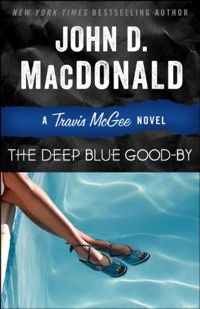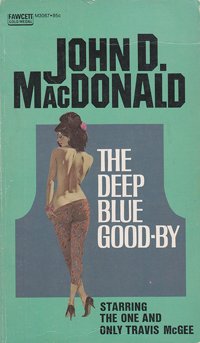 Writing Travis McGee from 1964 to 1984, John D MacDonald earned admiration from a diverse but luminous cross-section of his fellow writers. Kingsley Amis, Stephen King, Elmore Leonard and Carl Hiaasen have all praised him. The latter two are of particular note for crime fiction aficionados. With the possible exception of Charles Willeford, who came to prominence much later than MacDonald, no figure is more important to the development of South Florida crime fiction and ‘Florida noir’ than John D MacDonald.
Writing Travis McGee from 1964 to 1984, John D MacDonald earned admiration from a diverse but luminous cross-section of his fellow writers. Kingsley Amis, Stephen King, Elmore Leonard and Carl Hiaasen have all praised him. The latter two are of particular note for crime fiction aficionados. With the possible exception of Charles Willeford, who came to prominence much later than MacDonald, no figure is more important to the development of South Florida crime fiction and ‘Florida noir’ than John D MacDonald.
Now, thanks to Random House, readers can enjoy Travis McGee’s adventures via a new set of paperback editions. MacDonald’s first McGee novel, The Deep Blue Good-by, was released last month in the US, and A Nightmare in Pink and A Purple Place for Dying are now available in both the US and UK. Subsequent books will also be released in due course. Readers may note another of MacDonald’s influences on contemporary crime fiction. Numerous series now use some theme to unify the book titles. Macdonald’s colours have been followed in the titles of Walter Mosley’s Easy Rawlins books, Sue Grafton uses letters of the alphabet, James Patterson’s numbers, and so on. Perhaps in homage or imitation of MacDonald’s McGee series.
As Mosley would later do, MacDonald begins with blue. A Deep Blue Good-by serves as a superb introduction to that uniquely Floridian hardboiled hero, Travis McGee. McGee is not a PI, he’s more of a beach bum. He lives on his houseboat, the Busted Flush, anchored in slip F18 of the Bahia Mar Marina. McGee mostly does as he pleases, but is not above working as a ‘salvage consultant’. If clients want something valuable back and have no legal recourse, McGee can procure it in exchange for half its value.
 But McGee sees his real job as being a sort of hardboiled ‘knight-errant’, usually aiding a nubile post-WWII damsel-in-distress. The pattern for the series is set in The Deep Blue Good-by when Cathy asks Travis McGee for help recovering a dubiously-earned fortune that her dead father left hidden. McGee takes the case, and it leads to a smarmy but persuasive lowlife named Junior Allen. And in his effort to learn more about Allen, McGee meets his latest victim, Lois Atkinson. Junior Allen had wormed his way into controlling Lois’ life and money, and she was reduced to a nearly catatonic state by the time McGee came along. In addition to being a brute and a treasure-hunting rival for Travis, Lois reveals that Allen is also a serial rapist. Travis proceeds with his plan to recover Cathy’s fortune and ensure that Junior Allen meets justice.
But McGee sees his real job as being a sort of hardboiled ‘knight-errant’, usually aiding a nubile post-WWII damsel-in-distress. The pattern for the series is set in The Deep Blue Good-by when Cathy asks Travis McGee for help recovering a dubiously-earned fortune that her dead father left hidden. McGee takes the case, and it leads to a smarmy but persuasive lowlife named Junior Allen. And in his effort to learn more about Allen, McGee meets his latest victim, Lois Atkinson. Junior Allen had wormed his way into controlling Lois’ life and money, and she was reduced to a nearly catatonic state by the time McGee came along. In addition to being a brute and a treasure-hunting rival for Travis, Lois reveals that Allen is also a serial rapist. Travis proceeds with his plan to recover Cathy’s fortune and ensure that Junior Allen meets justice.
Readers will not likely be surprised that something approximating these goals occurs in the plot’s resolution, though the actual conclusion is far more thought-provoking than the good guy putting the bad guy in jail. John D MacDonald’s contribution to hardboiled crime fiction was to take an unusually thoughtful hero and to place him against a series of brutal opponents. MacDonald created the character of Max Cady in his stand-alone novel The Executioners, which inspired two films, both titled Cape Fear. Cady would hardly be out of place in a rogues gallery of Travis McGee villains.
McGee’s elaborate plan includes trips to Texas and New York, and he doesn’t make very much money in the end, despite being somewhat successful in his salvage attempt. In true noir fashion, the author is not afraid of confronting McGee or readers with harsh realities. MacDonald’s terse, telegraphic prose is equally adept at conveying action sequences and Travis McGee’s offbeat, independent philosophical musings. And the musings are what make the McGee novels unique among hardboiled fiction, though they may prove off-putting to some readers.
 Critics may charge that McGee represents an outdated and politically incorrect view of masculinity, and they may be right. But perhaps this misses the point. Yes, Travis McGee is a womaniser much like James Bond or early Spenser. And yes, woman are miraculously restored by his aggressive, testosterone-soaked presence. And yes, this makes McGee an anachronism. But so does McGee’s disgust at the rapacious development of South Florida or dislike of everything from credit cards to deodorant. McGee is an odd duck – a hulking, mercenary odd duck with a blonde crew cut. Travis McGee is a man who refuses to change much of anything. He thoughtfully but forcefully maintains his independent life, a life of action that makes for brisk reading and also begins to weigh on McGee by the end of the series.
Critics may charge that McGee represents an outdated and politically incorrect view of masculinity, and they may be right. But perhaps this misses the point. Yes, Travis McGee is a womaniser much like James Bond or early Spenser. And yes, woman are miraculously restored by his aggressive, testosterone-soaked presence. And yes, this makes McGee an anachronism. But so does McGee’s disgust at the rapacious development of South Florida or dislike of everything from credit cards to deodorant. McGee is an odd duck – a hulking, mercenary odd duck with a blonde crew cut. Travis McGee is a man who refuses to change much of anything. He thoughtfully but forcefully maintains his independent life, a life of action that makes for brisk reading and also begins to weigh on McGee by the end of the series.
In many ways, John D MacDonald makes an intriguing foil for the similarly named Ross Macdonald. Both MacDonald and Macdonald had a basic plot which was utilised over and over, reworked slightly each time. Like Ross Macdonald’s Lew Archer, Travis McGee is dealing with a changing society and often addressing themes of disenchantment and generational conflict. Of course, the prescriptions offered by the two hardboiled titans could not be more different. The Freudian-tinged Archer was sympathetic and often non-judgmental, seeking understanding as much as justice. McGee was much less hip, wading into the world when heavy-handed heroics were required and then going back to his solitary perch on the Busted Flush.
Travis McGee was not on a search for enlightenment, but you may find some when reading MacDonald’s series. An insightful know-it-all, a thoughtful man of action, McGee is as fascinating when laying bad guys out as he is when lamenting a Florida landscape that was then disappearing and now is no more. But it still exists in John D MacDonald’s books. And crime fiction readers owe Random House their thanks for keeping old Florida and its guardian alive. I might wish for the original Robert McGinnis illustrations that graced the covers of first-edition McGee adventures, but the sexual politics displayed might mark the books as dated and repel more readers than they attract. Besides, the covers are secondary.
“Travis McGee’s still in Cedar Key / That’s what John MacDonald said,” Jimmy Buffet sang several decades ago. Thanks to Random House, Travis McGee will still be a Florida beach bum for quite a while.









Cannot say enough good things about this series. Spent some time working out of Ft Lauderdale and read lots of them there. Went to the Marina….but never found “The Busted Flush”
Spooky timing, I read this about a week ago. I’ve already got the next couple in the series lined up.
Excellent piece, thank you — quite eloquently gets at the appeal of both McGee and Archer.